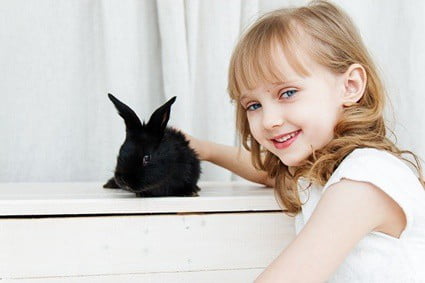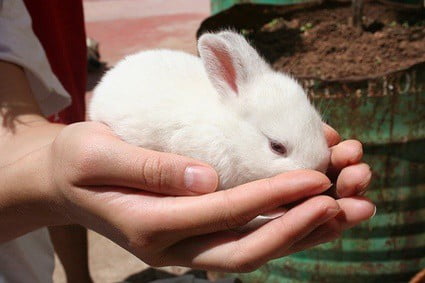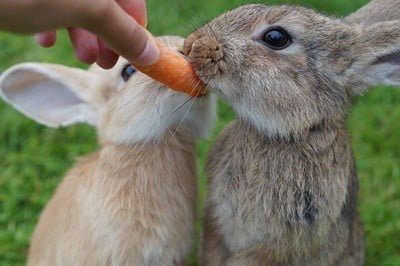Rabbits are naturally social creatures, so keeping your rabbit company is important to ensuring its health and happiness. With that said, you may be wondering how much time your pet rabbit needs to spend with you. You don’t want to overstimulate your bunny, nor leave it to feel lonely.
It’s best to spend about an hour each day with your rabbit. On average, early morning is the best time to play with a rabbit, as it will be the most active. After that, the evening will be a prime opportunity for petting and cuddling. Younger rabbits may need your undivided attention as they have more energy. In contrast, older rabbits are less energetic and may appreciate more passive affection from you.
Above all else, you should only spend quality time with your bunny. This can involve active play, with toys, mazes, and tricks. It can also involve activities like roaming around the home or hunting out hidden food. If you’re pressed for time, then it’s always best to give a rabbit half your attention, instead of no attention at all.
Do Rabbits Need a Lot Of Attention?
Despite their calm and quiet demeanor, rabbits need plenty of attention from their owners. Companionship is important for a bunny’s welfare, according to The Veterinary Nurse.
In the wild, rabbits live in colonies. This can help rabbits avoid predators and find food. As a natural byproduct, rabbits are evolutionarily used to companionship. Bunnies are famous for their impressive reproduction rates. With that in mind, you can imagine the size of an average colony.
However, domestic rabbits often do not have a colony of their own. Most pet owners will only keep one or two rabbits. This leaves most pet bunnies with just their owners for attention and companionship.
To compensate for the lack of a colony, rabbits should be showered with attention. Improper socialization can cause:
- Stress
- Depressive behavior
- Aggression
- Destructive habits
How Much Quality Time Do Rabbits Need?
Ideally, a rabbit should be given an hour of attention from its owner each day. This will ensure it receives the socialization and enrichment it needs. When kept in high spirits, a rabbit will experience less stress. The result will be a calmer, healthier, and friendlier bunny.
Socialization is especially important for young rabbits. Exposure to humans will help them bond with their owners and avoid bad habits like:
- Biting
- Freezing
- Acting aggressive or defensive when picked up
- Hiding from humans
Socialization is also crucial to newly adopted rabbits. That will help it adjust to your household. This will make grooming, training, and handling much easier.
In fact, spending time can also be beneficial for you. This is supported by the Journal of the Hellenic Veterinary Medical Society. Here, it was determined that rabbits as a therapy animal are beneficial to both humans and the rabbit.

How To Give Attention To Your Rabbit
Overstimulating or stressing the bunny may cause more harm than good. Interacting with the rabbit correctly will ensure you both come away happy and fulfilled.
Attention Should Be On The Rabbit’s Terms
Never force a rabbit to spend time with you. If the bunny appears skittish or unwilling to interact, then it’s wise to back off. The rabbit may feel unsafe, tired, or agitated at the moment. By forcing attention, you could motivate it to hide, bite, or refuse your attention again later. If your rabbit doesn’t seem to be up for socialization, then try again at a different time.
With that said, your bunny may instead seem interested or eager for your affection. In that case, there’s no such thing as too much attention. Feel free to play, pet, or cuddle with your rabbit for as long as it allows. If it seems energetic for many hours, then have fun. If playtime only lasts a few minutes, then try again later when the bunny feels active again.
Know Your Rabbit Properly
Some rabbits may prefer a different way of socializing than others. For example, younger rabbits may enjoy playtime without hesitation. Older rabbits may be comfortable just lounging about or lying down beside you. Senior rabbits might only curl up in your lap, refusing to bat at toys.
Likewise, some rabbits like to socialize more than others. You may own a rabbit that prefers to be left alone. In contrast, your next rabbit may be desperate for your constant attention.
Because of this, it’s wise to get to know your rabbit. By understanding its preferences, you can avoid overstimulating a shy rabbit. Or under-stimulating a very active rabbit.
Paired Rabbits Need Less Attention
Rabbits are very social creatures. As such, it may be easier to keep two rabbits instead of just one. If you find it hard to spend ample time with your rabbit, consider giving it a friend. A pair can easily keep each other company. They’ll provide all the socialization each other needs.
So long as the pair is well-fed, housed, and free of illness, they will be happy with less attention from you. As a bonus, they may become more docile and easy to manage.
Spend Quality Time Together
An hour of time alongside your rabbit is different than fifteen minutes of dedicated play. When socializing with your bun, aim for quality time.
For young, energetic rabbits, this means being fully focused and engaged. You can play games, train the bunny to perform tricks, or run mazes.
For older or low-energy rabbits, this can be less intensive. You can sit near your rabbit and perform a different activity. If the rabbit grabs your attention or signals for a cuddle, you can accommodate.
When To Play with A Rabbit
Rabbits are crepuscular creatures. This means they are active during the twilight hours. It’s best to spend time with your rabbit during the early morning and early evening. Of course, the activities you choose must be suited to its energy levels.
Morning
Rabbits will have greater energy in the morning, after waking up at dawn. It will busy itself running around, grooming, foraging, and playing with its toys.
By mealtime, it will likely run off to look for you and a meal. This is a great time to play games and teach tricks. All energetic activities can be reserved for these high-energy hours.
Around mid-morning, your rabbit’s energy will start to wane. You’ll likely find it dozing off in its favorite sleeping spot or lying down to relax.
Evening
Once evening arrives, rabbits will grow active again. After a long day, however, your bunny may lack the energy for heavy play. It will probably ask for strokes and cuddles.
If your rabbit dislikes petting, you may find it more docile at this hour. Now is a good time to soften up less cuddly rabbits. Stubborn ones may refuse. However, they’ll likely spend time relaxing or playing around you.
What Do Rabbits Like To Play With?
Rabbits enjoy playing with toys or performing tricks. For less intensive ways to bond with your rabbit, you can start by:
- Giving your rabbit a rope to chew
- Creating a maze to run around in
- Hiding a treat for the bunny to find
Toys can also keep your bunny entertained when you’re not present. A bored rabbit is likely to lash out, chew through objects, or simply destroy its habitat. To prevent that, try placing a few small toys in your rabbit’s hutch. These forms of enrichment can include:
- Large brown paper bags
- Baskets
- Paper towels and newspapers
- Untreated wood chips
- PVC tubes as tunnels
- Cardboard boxes opened at both ends
- Baby toys
Things To Do With A Rabbit
Playing is a great way to spend time with your rabbit. But what if you’ve run out of play ideas? Check out these creative, alternative ways to bond with your rabbit:
Go for A Walk
A harness will ensure your bunny is safely secured. With that in place, you can roam around the backyard, wander through a calm park, or even mosey around the neighborhood.
This lets your rabbit enjoy the sunshine, fresh air, and even grass under its feet. It also teaches it to associate your company with good times. Just be sure the area is safe from predators or startling sounds.
Roam Outside The Hutch
You can also let your bunny roam freely around your house or bedroom. Time outside its hutch is a great way to provide your rabbit with exercise and enrichment.
Even if you don’t play with the bunny, it will love investigating objects. It can also sniff smells and squeeze itself into spaces. Just be sure the area is free of harmful objects or chemicals. All surfaces must be safe for rabbit feet.
Place a few toys, some hay to munch on, and a litter box near the rabbit. So long as it can’t escape from this area, let it have fun.
Foraging
Rabbits forage in the wild. This instinct can easily become a form of play in a domesticated rabbit. To keep it well-exercised, hide food in places that are hard to reach. Your rabbit can work for the treats – wiggling, jumping, and being clever to manage it. Good hiding places include:
- Inside toys
- Underneath sofas
- Inside mazes
- On the lower levels of bookshelves
- Inside tunnels
- Under blankets
- Inside empty toilet paper rolls
- Tangled inside paper bags.
To mix things up, try hiding different foods. You can use hay, fruits, veggies, or specific bunny treats.
Dig Box
Rabbits love to dig. However, indoor bunnies rarely have the chance to do so. After all, it’s dangerous to let pet rabbits tunnel throughout your yard.
For a safe alternative, you can create a dig box. All you need is a sturdy container and some digging material. For the container, use any of the following:
- A shallow dish
- A flowerpot
- A storage container
Just make sure it’s deep. After that, fill the container with your digging material. You can always use dirt for an authentic experience, but it can be messy and hard to clean. Instead, you can opt for other rabbit-friendly materials. Consider:
- Shredded newspaper
- Paper
- Hay
What To Do If You Lack The Time
Companionship is important for a rabbit. Owners should ensure they’ve dedicated enough time to caring for their pets. However, that’s not always possible.
If you’re pressed for time, don’t worry. These methods can guarantee your rabbit still gets the attention it needs.

Break Up The Time Spent with Your Rabbit
It’s recommended to spend an hour with your bunny each day. However, if you can’t manage that, try breaking up that hour into smaller increments. For example, you can spend 30 minutes with your rabbit in the morning before work. Then, when you come home in the evening, you can spend another 30 minutes together.
Alternatively, you can play with your bunny for 10 minutes, six times a day. If you’re doing your homework or working from home, this is a great opportunity to take a break. Your bunny will appreciate the effort, and you can benefit too.
Of course, the objective here is consistency and quality. One or two minutes isn’t much time for your rabbit to relax or play. As such, be sure to have at least 10 minutes in each bonding session. Otherwise, your rabbit won’t have time to actually enjoy any of it.
Do Activities Alongside Your Rabbit
Of course, paying half-attention to your rabbit is far better than no attention at all. If you can’t devote a full, undivided hour, then try for half-attention over two hours. As you complete another task or activity, try to:
- Place the rabbit in your lap
- Pet the rabbit with one hand
- Talk to the rabbit in calm, warm tones
There are also tasks that your rabbit can join in on. For example, you can:
- Do your workout routine as your rabbit plays nearby.
- Eat a meal with your rabbit. You can even sneak in a few treats, but make sure they’re rabbit-safe.
- Enjoy a hobby like sewing, drawing, writing, or crafting as the rabbit smells and investigates the pieces
- Do your homework or office work while providing cuddles.
Try to give your rabbit the best attention you can. So long as you’re actively trying to bond with your pet, that time counts.
If you’re struggling to give your rabbit the attention it needs, consider asking for help. For example, reach out to your social circle. There’s a good chance someone can keep your rabbit company for an hour or two. It’s also likely this person will be happy to oblige. Just be sure that your rabbit is comfortable with this person. You should also ensure they know how to care for a rabbit.
Rabbits can spend a lot of time all on their own, However, there’s a difference between being alone and being lonely. If your rabbit is bored and lacking in attention, it may be bad for its health.
By spending at least an hour with your rabbit, you can make it feel well socialized and loved. Just choose the right activities, get to know what your rabbit likes, and have fun.


Hi, my rabbit is a Lionhead and he doesnt have another rabbit to play with, how much time would i have to spend with him if he didnt have any fellow rabbits?